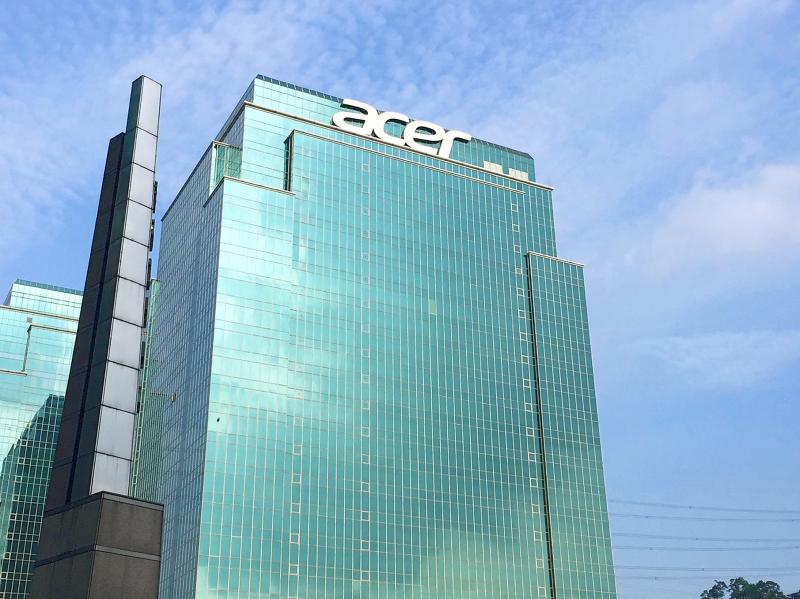PC vendor Acer Inc (宏碁) yesterday confirmed that it was hacked twice in one week — once in Taiwan and once in India — but denied any damage or leak of customer data.
Acer spokesperson Steven Chung (鐘興維) said that the customers in India whose data were affected were informed, while no user data in Taiwan was compromised.
The hackers have tried to initiate communication, but Acer has not responded, Chung said.

Photo: Cho Yi-chun, Taipei Times
“We are not going to negotiate and it is not company policy to pay ransom to hackers,” he said.
Upon detecting the hack, Acer initiated all security protocols and conducted a full scan of its systems, he added.
A group of hackers calling themselves the Desorden Group has claimed responsibility for the two attacks, said tech news Web site zdnet.com, which was contacted by the group.
The hackers told zdnet.com that the attack was not done to obtain a ransom, but to “prove their point” that Acer does not practice the latest computer security, leaving its data and servers vulnerable to attacks.
Last month, the Desorden Group told the Web site Databreaches.net that their name stands for “chaos and disorder.”
“Desorden attacks along supply chains to create a higher level of disorder and chaos affecting many parties, rather than the victim itself. If the victim fails to pay, Desorden sells the data on the black market within a few days,” the group said, adding that they had hacked Malaysian logistics company ABX Express.
Chung did not confirm the identity of the group, saying only that “they have sent their message to the media.”
Chung also declined to give details about the number of customers affected by the Indian hack, saying that investigations into the two attacks are ongoing.
Acer said in a public statement that the incidents did not cause service disruptions and that the financial impact was limited.
Acer was hacked in March by the group REvil, who asked for a ransom of US$50 million.
Acer countered with an offer of US$10 million, which was rejected by the hackers, zdnet.com reported.
Chung declined to comment on the March incident, but reiterated that Acer would neither negotiate with hackers nor pay ransoms.
A previous statement from Acer said only that it had reported the incident to law enforcement in several countries.
Acer is not the only Taiwanese company to have experienced ransomware attacks. Contract manufacturer Hon Hai Precision Industry Co (鴻海精密), industrial computer manufacturer Advantech Co (研華) and Compal Electronics Inc (仁寶) were all reportedly hacked last year.

IN THE AIR: While most companies said they were committed to North American operations, some added that production and costs would depend on the outcome of a US trade probe Leading local contract electronics makers Wistron Corp (緯創), Quanta Computer Inc (廣達), Inventec Corp (英業達) and Compal Electronics Inc (仁寶) are to maintain their North American expansion plans, despite Washington’s 20 percent tariff on Taiwanese goods. Wistron said it has long maintained a presence in the US, while distributing production across Taiwan, North America, Southeast Asia and Europe. The company is in talks with customers to align capacity with their site preferences, a company official told the Taipei Times by telephone on Friday. The company is still in talks with clients over who would bear the tariff costs, with the outcome pending further

WEAKER ACTIVITY: The sharpest deterioration was seen in the electronics and optical components sector, with the production index falling 13.2 points to 44.5 Taiwan’s manufacturing sector last month contracted for a second consecutive month, with the purchasing managers’ index (PMI) slipping to 48, reflecting ongoing caution over trade uncertainties, the Chung-Hua Institution for Economic Research (CIER, 中華經濟研究院) said yesterday. The decline reflects growing caution among companies amid uncertainty surrounding US tariffs, semiconductor duties and automotive import levies, and it is also likely linked to fading front-loading activity, CIER president Lien Hsien-ming (連賢明) said. “Some clients have started shifting orders to Southeast Asian countries where tariff regimes are already clear,” Lien told a news conference. Firms across the supply chain are also lowering stock levels to mitigate

NEGOTIATIONS: Semiconductors play an outsized role in Taiwan’s industrial and economic development and are a major driver of the Taiwan-US trade imbalance With US President Donald Trump threatening to impose tariffs on semiconductors, Taiwan is expected to face a significant challenge, as information and communications technology (ICT) products account for more than 70 percent of its exports to the US, Chung-Hua Institution for Economic Research (CIER, 中華經濟研究院) president Lien Hsien-ming (連賢明) said on Friday. Compared with other countries, semiconductors play a disproportionately large role in Taiwan’s industrial and economic development, Lien said. As the sixth-largest contributor to the US trade deficit, Taiwan recorded a US$73.9 billion trade surplus with the US last year — up from US$47.8 billion in 2023 — driven by strong

RESHAPING COMMERCE: Major industrialized economies accepted 15 percent duties on their products, while charges on items from Mexico, Canada and China are even bigger US President Donald Trump has unveiled a slew of new tariffs that boosted the average US rate on goods from across the world, forging ahead with his turbulent effort to reshape international commerce. The baseline rates for many trading partners remain unchanged at 10 percent from the duties Trump imposed in April, easing the worst fears of investors after the president had previously said they could double. Yet his move to raise tariffs on some Canadian goods to 35 percent threatens to inject fresh tensions into an already strained relationship, while nations such as Switzerland and New Zealand also saw increased